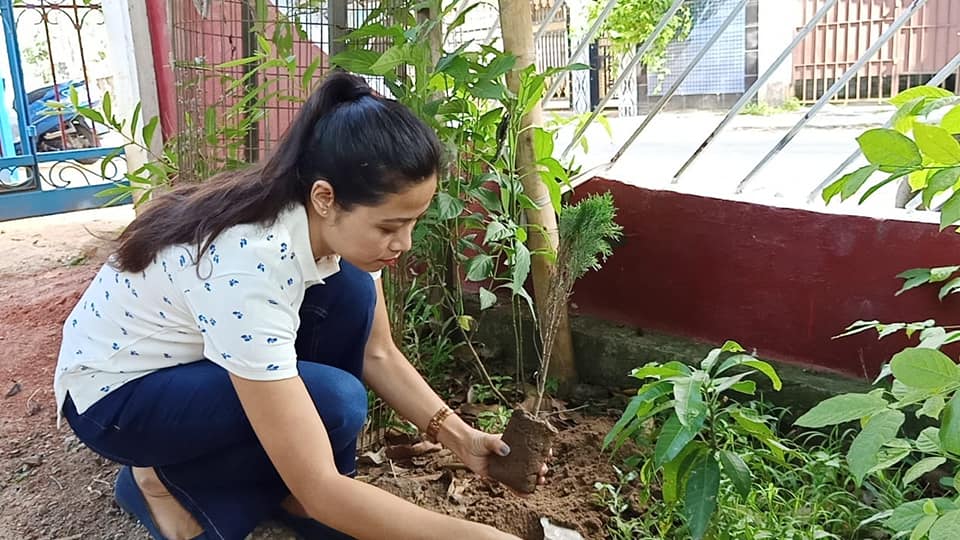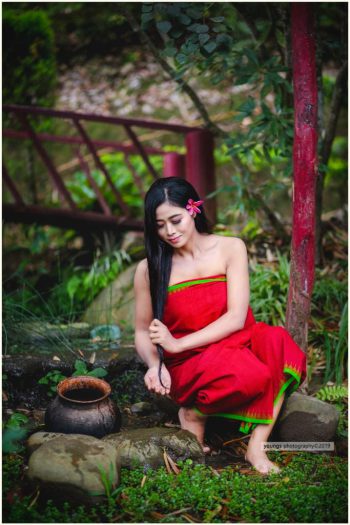
In the courtyard of a house in a village in Manipur, there sits a young woman, indulgently watching a group of children running riot in their world of make-believe. It is chaotic, loud, almost disorderly. Soon the woman’s voice rings clear across the room as she calls the house to order. The children gather around her, curious and eager. A class has just begun. Leishangthem Tonthoingambi Devi or Tonthoi as she’s better known, is about to share the magical world of theatre with the little residents of Chingkhu village in East Imphal district. It is a structured class with role playing, gender bending, singing, emoting, empathising. It is part of a “Theatre in Education” course that Tonthoi runs. It is her way of giving back to a universe that she believes has been so generous to her.
Actor, teacher, lutanist, dancer, polyglot, social worker, football player: Tonthoi is Manipur’s renaissance woman. If she puts her mind to something, be sure that she will soon bemaster of the craft. That’s exactly how she came to represent her university at football tournaments and why she is Manipur’s very own national award winning actor.
There’s an audaciousness about Tonthoi; a dare-devilry that makes her look the world right in the eye and do what others are chary of; an overwhelming sense of adventure that makes her defy her well-meaning parents. Like when, unbeknownst to her mother, who wanted her to be a doctor, she enrolled secretly in a diploma course in dance or took part in an acting competition or learnt to play the Pena, the indigenous Manipuri lute. It is no surprise then that many of the film roles that Tonthoi has chosen,revolve around social issues and women with great strength of character. And it is also no surprise that her biggest supporter now is her once-censorious mother.
At 33, Tonthoi has more than 20 movies to her credit - a remarkable feat for someone who came into films “out of the blue” when, aged 19, she won Manipur’s Dawn (aspiring actress) award in 2006. Some would say Tonthoi is destiny’s child for if she hadn’t conspired with her brother, Homendro and her singer father, Ibungomacha Singh, to keep her mother in the dark about the Dawn contest, we may never have seen her win the 2011 National Film Fare award for best supporting actress for her role in O. Gautam’s Phijigee Manias a daughter and a sister trying to keep her family together.It is the Dawn award that gave her her first break in films and had directors from the region notice her.

For all her audaciousness, Tonthoi would rather watch her movies in private. When she speaks to NEStories, it isn’t so much about her achievements, but about her beloved “Theatre in Education” project, the volunteer work she does among differently-abled people in Bhopal and of how “inadequate”, “small” and “raw” she felt working in Chan Heisnam’s“Nangna Thawaine”, her first big movie. It’s hard to miss the excitement and nervousness she experienced when she won her first national award in 2011 and then met Vidya Balan, who, till then, she had only seen on screen. That was ten years ago. Tonthoi now has reached a point in her career where stereotypical roles don’t work so much for her. “I want to feel challenged in every new film I make,” she says, that spark of dare-devilry showing up again.
To begin with, how did it feel to receive the Best Supporting Actress Award at the National Film Award 2011?
I did not believe it. I told my colleagues to cross check the awards list again, that it could be a mistake. I also took out my laptop and checked myself to ensure the newswas true. I was overjoyed. I had no words. But, you know, you have mixed feelings. Awards come with more responsibilities and expectations.
When I went to Delhi to receive the award, I met Vidya Balan, who got the best actress award, and many other film personalities. It was a meaningful interaction, meeting so many people whom you see only on screen; it was an experience indeed.
Can you briefly tell us about Phijigee Mani your award winning film.
The film was released in 2010. Phijegee Mani can be roughly translated as “My Only Jem”. It was directed by O. Gautam. It is a family drama. I played the role of a daughter, a sister - caught in a family dilemma set in the context of children (sons to be specific) moving out from their home state for better employment. My role as a daughter and sister involvedbringing the family together.
When and how did your entry into films start? Did you have training or do a film course? Did a director notice you?
My entry into films started when I won the DAWN 2006 actor hunt - an annual event organised by Bright Films for selecting aspiring actors in Manipur. I was offered a film after I won the award. Thus began my journey in 2007. I love cinema, but I never really did attempt it nor did I have the opportunity. DAWN 2006 gave me an entry into the world of cinema.
Tell us about your first film, how it all went. Did you feel then that you were cut out for films?
My first film,“Nangna Thawaine”, was directed by Chan Heisnam. But I was not satisfied with myself. I felt small in front of other senior actors. Since I came into films out of blue with no experiences, no background, I felt I was “the odd one”. Those senior actors and actresses were experienced. When I worked with them, I felt I was too small, meaning, I was comparatively raw. Like when the shoot began I would not understand so many terms and words. I felt bad that dubbing needed to be done for my dialogues. So it didn’t feel real and I felt bad, I felt so inadequate.
So what happened after that?
After my first film, I decided to do a training course. I promised myself that unless I trained myself to perfection, I would not do films anymore.
My first experience challenged me. I took a six-month course, training under Oja Khuman in Imphal. Only then did I start accepting film offers again. Since then I feel far more confident.

What kind of roles do you like to do? Of the films you’ve done so far, whichdid you like the best?
Each film is unique. I am a bit choosy. I mostly agree to work in films if I like the script. Given a chance and more options to choose from, I wouldn’t like to stick to one stereotypical role. I would like to continue to experiment. I want to feel challenged in every new film.
I liked my role in Phijigee Mani. I thinkpeople accepted me too. Basically it is the viewers who decide what role suits me. The viewers and fans are the best to decide.
Most of your films areon social subjects or about family and society. Are these conscious choices or did it just come your way?
Yes, most of my films are more with social messages. And I do prefer such stories and roles. Of course, as an actress I would like to experiment with different roles. At times we do not have a choice - like a Director approaches you personally, and you cannot say no. It is not such a big industry that an actor in Manipur can have many choices.
Tell us about some of your films outside the state of Manipur?
I have done two Assamese films. Barsharanya-The Rainforest, directed by Diganta Mazumdar, is a children’s film that won the prestigious Golden Palm award in the Environmental Category at the Mexico International Film Festival. The other is Ishu, directed by Utpal Bopujari. The film is on the subject of witch-hunting in Assam, based on a novel by Manikuntala Bhattacharya.
I did a lot of training for these films, especially dialogue delivery. But I managed to pull it though. The best part is that the directors believed in me and had faith in me.
What is your take on regional films, any plans to go to Bollywood?
We are being recognised; people have begun taking notice of our work. Now there is a lot of competition even at the state level. Regional films or state films can also make it to the national level. My national award itself is one example. This means even state film can also make it big. So I don’t think one needs to go to Bollywood to make it big.
Tell us about your parents. Are they supportive?
 My father is a singer and a theatre artist. He has never outrightly told me what I should do with my life. At times he helps me out with my acting skills. My mother was totally against my venturing into films or the entertainment industry, like many of her contemporaries. She wanted me to be a doctor. But now she is my support, my partner and anchor. My second brother is also slowly getting into film production now.
My father is a singer and a theatre artist. He has never outrightly told me what I should do with my life. At times he helps me out with my acting skills. My mother was totally against my venturing into films or the entertainment industry, like many of her contemporaries. She wanted me to be a doctor. But now she is my support, my partner and anchor. My second brother is also slowly getting into film production now.
When you’re not in front of the camera or shooting a film you are reaching out to the less privileged and doing your bit to contributeto the betterment of society. Can you tell us more about this? What are the causes or initiatives you have taken up?
Every morning I take classes for children. This is part of my initiative to spreadtheatre as a learning process ineducation. Our home courtyard serves as the classroom. I also involve myself in creating awareness on the environment, I go to schools and plant trees so that children understand these values. I love working with children. Recently I also did some work in the rehabilitation of women who are socially excluded.
During this lockdown I have contributed to distributing relief and ration to those in need in the state. I do all these as a personal conviction not for any publicity.
Tell us more about your Theatre in Education project
When I won the National Award, I was given the responsibility to take this up. Once I decided to shoulder this responsibility, I did a postgraduate course in “Theatre in Education”, at the National School of Drama in Tripura. So I do theatre alongside cinema. I give free education to children using theatre. Of course, whoever is interested is invited to be part of it. My attempt is to bring in theatre as a learning method in education. It is informal education where children are taught in the form of role play, acting, story-telling, use of music etc. It is basically a self-learning method, not formal textbook teaching. This is about applying what we learn in our day-to-day lives. It is a form of education that is lively and helps a person learn and apply their mind. It also helps develop logical thinking.There is no back bencher or first bencher in this kind of education- one learns from the other. I have about 15-20 children currently.
Presently, I am also a volunteer with ARUSHI, an organisation in Bhopal working with differently-abled persons. I am trying to bring in various forms of theatre into their learning process. I am attempting to teach drama as a form of learning and skill. This work has halted now due to the lockdown; I will continue once the lockdown is lifted.
With so much on your plate now, what are your immediate plans? Any new release or current film project?
Yes, I have a few releases coming up. I do have many things in mind, so much I want to do.But I can’t reveal that now. Maybe, you all will get to know soon.

